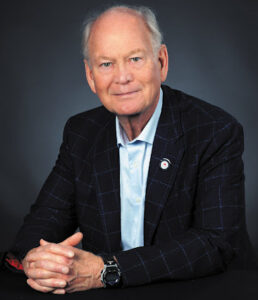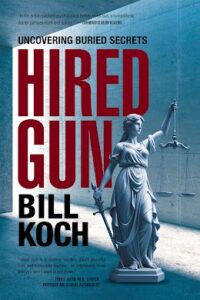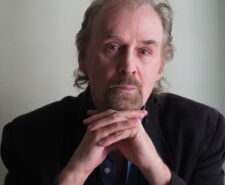Psychological misconduct
July 31st, 2025

Bill Koch’s debut novel Hired Gun: Uncovering Buried Secrets (FriesenPress $21.99) is steeped in insider knowledge of physician misconduct and the real-world dilemmas faced by experts called to testify in court. Hired Gun brings that career to bear in a psychological mystery set between Vancouver and Gabriola Island. The story follows forensic psychologist David Lipman, who becomes a suspect after two of his former patients die under suspicious circumstances. As he tries to clear his name, he’s forced to confront ethical boundaries he once wrote about and break them.
Koch himself spent forty years working at the intersection of mental health, trauma and justice. He served as registrar and president of the College of Psychologists of British Columbia and is now clinical professor emeritus at UBC’s Faculty of Medicine. He has authored a textbook on trauma and forensic assessment and won several fiction awards after graduating from The Writer’s Studio at SFU. A longtime resident of West Vancouver and Gabriola Island, he now serves as president of the North Shore Writers Association.
*
Question: Hired Gun is your first novel. Why did you write it?
Answer: I wrote Hired Gun to both entertain and provoke meaningful discussion. I wanted to explore the difficult topic of sexual misconduct by trusted professionals and educate readers about aspects of mental health, while telling a story that grips and moves them.
 Q: How did the idea for the book come about?
Q: How did the idea for the book come about?
A: The idea first took root in 2005, when I was assessing 22 women who sued the same family doctor for sexual assault. The case divided the small town where it took place, especially along class lines—the powerful versus the relatively powerless. The defendants included the doctor, his business partners, and the College of Physicians and Surgeons of BC. Although the idea lingered in my
mind for years, I didn’t begin writing until 2021, when I became more serious about learning the craft of storytelling.
Q: Your long career as a forensic and clinical psychologist clearly informs the novel. Did you conduct additional research?
A: My professional background provided more than enough. I’ve investigated ethics complaints involving sexual misconduct, assessed psychological injuries following sexual assault, and reviewed disciplinary actions involving psychologists, dentists, and physicians. Part of my consulting practice involved evaluating healthcare professionals’ fitness to return to practice following disciplinary actions. I also authored Psychological Injuries: Forensic Assessment, Treatment, and Law (Oxford University Press, 2006), a widely respected text in the field.
Q: What sets Hired Gun apart from other novels that feature forensic psychologist protagonists?
A: Many fictional forensic psychologists turn into amateur detectives. David Lipman does not. He stumbles upon damning evidence he was not meant to see and must decide how to reveal it despite ethical constraints. Thus, he faces a conflict between professional codes and moral duty. Also, Hired Gun presents mental health conditions—like the narcissism of the villain and PTSD of survivors—in a realistic and relatable way, grounded in clinical truth rather than pop culture stereotypes.
Q: How much of David Lipman is based on you?
A: My wife jokes that David is my nicer twin. His name was chosen intentionally—“Lipman” can be translated as “Dear Man” or “Beloved Man.” Like me, he’s burdened with what psychologists call an “inflated sense of responsibility”—an overwhelming urge to protect others and “do the right thing,” even when the right thing isn’t clear. Much of David’s professional background and his disillusionment with unethical practitioners mirrors my own experience. There’s a moment in the novel (page 53) when a cop, cruising the red-light district, reflects: “Who were these people with whom he shared a Y chromosome?” I’ve asked myself that very question—more than once.
Q: What broader issues did you consciously set out to explore?
A: Sexual assault by high-profile men—Harvey Weinstein, Jeffrey Epstein, and others—gets frequent media coverage. But less attention is paid to misconduct by seemingly ordinary professionals who exploit positions of trust: doctors, therapists, coaches, and teachers. Research suggests 12 -16% of male and 2-3% of female mental health professionals admit to sexual misconduct with patients. A German study found that nearly 5% of women reported sexually harassment or assaulted by a healthcare professional. In Canada, a recent report documented sexual abuse by over 200 coaches involving over 600 athletes. If there’s one thing that remains true in every survivor’s story, it’s that they deserve to be believed and supported. The #MeToo movement has made strides, but we still have a long way to go to change institutional responses and protect victims.
Q: What is the biggest misconception about sexual misconduct?
A: Here are a few common myths that persist:
- Stranger rape is rare—most assaults are by someone the victim knows
- Rates of sexual misconduct by trusted professionals (physicians, therapists, teachers, coaches) are higher than many realize
- Institutions often fail to protect victims due to:
- Evidentiary challenges in court (<1% of sexual assaults result in a conviction)
- Insider bias within professional regulatory bodies, and
- Organizational cover-ups are designed to avoid bad publicity
Change is underway, but painfully slow.
Q: You portray the impact of sexual misconduct without glorifying it. How did you balance the seriousness of the crime with writing a compelling mystery?
A: It’s sad but true—suffering sells. But sexual assault isn’t just physical—it often causes enduring shame, isolation, and psychological scars that impact relationships, employment, and a sense of safety. In Hired Gun, the central mystery revolves around which of two men—each with differing degrees of pathology—is responsible for the crimes. The reader is left to navigate their distorted worldviews, each reflecting broader societal issues around misogyny and power. I aimed to respect victims’ experiences while also crafting a morally complex, compelling story.
Q: Dr. Wolff is depicted as remorseless and vile. How realistic is he?
A: Wolff displays many narcissistic traits. The book opens with a childhood backstory, one steeped in domestic abuse and a father reinforcing the child’s belief that he is special. That kind of parental modelling is often the root of later personality dysfunction. While Wolff is an extreme example, his behaviours are drawn from real cases: sexual exploitation, violence, even murder to silence victims. Though extreme, the psychological profile is grounded in documented examples from my professional experience.
Q: The novel shows how hard it is for victims to press charges. What helped Lian succeed?
A: Sexual assault cases are difficult to prosecute, whether in criminal, regulatory, or civil courts. Lian pursued a personal injury lawsuit, which gave her key advantages:
- A lower burden of proof (balance of probabilities, rather than beyond a reasonable doubt),
- Adjudication by a judge or jury rather than by peers of the accused,
- Greater control over whether the case proceeds.
That said, personal injury cases against physicians remain daunting. In Canada, the Canadian Medical Protective Association (CMPA) has a longstanding policy not to compensate victims of sexual assault, even when guilt is proven.4 In Hired Gun, I bypassed the compensation logistics, assuming the perpetrator has assets that allow for restitution.
Q: Vancouver features prominently in the novel. Why set it there?
A: It’s home. I live in West Vancouver, worked in one of its major teaching hospitals, have testified frequently in the law courts, and spend time in the Gulf Islands. It’s a place I know intimately and could describe with authenticity. Miami, Toronto, or New York are great cities, but Vancouver is in my blood.
Q: [Spoiler Alert] The book ends on an uplifting note. Wish fulfillment or reality?
A: Reality, definitely. The idea that trauma inevitably ruins lives is a myth. While a small percentage of survivors experience chronic distress, most recover, sometimes remarkably so. Humans are resilient. And over the past few decades, we’ve developed much more effective treatments for trauma-related disorders.
Q: Final message for readers?
A: I hope readers come away with a clearer understanding of the obstacles victims face and the systemic changes still needed to protect them. And perhaps, a renewed sense of empathy.
Q: What are you working on next?
A: You write what you know. I’ve spent a lifetime exploring how emotions, relationships, and mental health shape our lives. And, of course, psychologists aren’t immune to suffering themselves. My next project is a novel-in-stories titled Shrinks. It’s in the early revision stage and features interconnected tales about a group of psychologist friends, including David Lipman, in his pre-Hired Gun life. Each story features a moral or emotional dilemma, whether involving a patient, a peer, or a family. 9781038329448


Leave a Reply